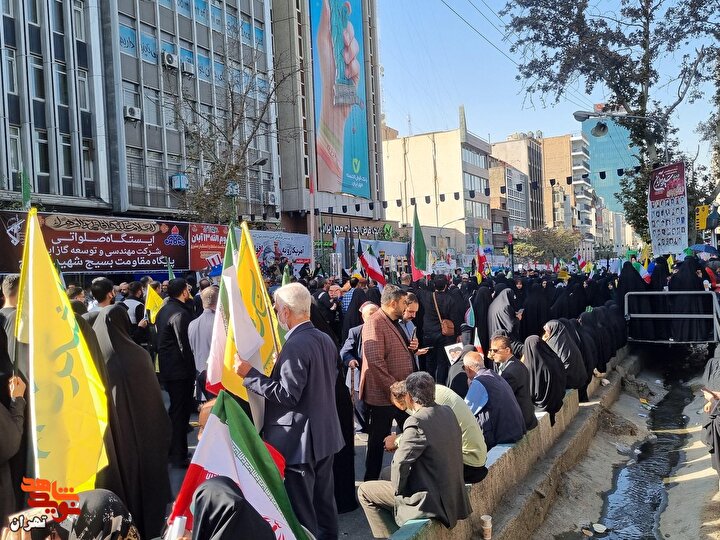
Imam Musa Sadr, the Flag-Bearer of Unity in Lebanon
Navideshahed: Imam Musa Sadr would always caution against Fitna (sedition) in the Lebanese society and urged different groups within the society to strengthen their unity.

This is according to an article published by Ana Shi’ei website on the occasion of April 13, the anniversary of the outbreak of civil war in Lebanon in 1975.
The article states:
Lebanese people will never forget April 13, 1975 because on that day, civil war showed its heinous face to the people of the country. A Palestinian bus was attacked by members of Kataeb group at a checkpoint in Ein-ar-Ramaneh district of Beirut and all the 30 Palestinians on board were killed.
Soon, fighting between armed forces from Kataeb group and Palestinians living in Shiyah district started and the government failed to stop it. That led to the resignation of Prime Minister Rashid As-Sulh on May 15, 1975, which intensified the crisis.
Right from the start of the clashes, Imam Musa Sadr held meetings with Palestinian Islamic movement’s leaders in Lebanon in a bid to prevent Fitna between the two nations of Palestine and Lebanon.
He condemned the massacre in Ein-ar-Ramaneh as a conspiracy by the Zionist regime to foment discord and enmity among the countries of the region.
Sadr made efforts to prevent a civil war and any damage to national unity. He urged the thinkers, scholars and educated members of all Lebanese groups and sects to avoid tension and try to make bridges.
He met with prominent Lebanese figures and called for the return of cooperation and interaction among Lebanese groups as well as between the Lebanese and Palestinians.
When Lebanon plunged into civil war, Sadr stood up to rescue the country and warned against occupation of Lebanon by the Zionist regime.
He sent letters to Arab leaders, who were planning to meet in Cairo, asking them to help Lebanon, but the letters went unheeded.
Later, when Southern Lebanon was occupied by the Zionist forces, Sadr held Arab governments responsible for the war and occupation.
Imam Musa Sadr then made visits to several Arab states, including Syria, Saudi Arabia, Kuwait and Algeria to convince their leaders to support Lebanon. As part of his trips, on August 28, he went to Tripoli, Libya, but was never heard of again and the Shia world is still hoping to hear about his return.
The End
Source: IQNA
This is according to an article published by Ana Shi’ei website on the occasion of April 13, the anniversary of the outbreak of civil war in Lebanon in 1975. The article states: Lebanese people will never forget April 13, 1975 because on that day, civil war showed its heinous face to the people of the country. A Palestinian bus was attacked by members of Kataeb group at a checkpoint in Ein-ar-Ramaneh district of Beirut and all the 30 Palestinians on board were killed. Soon, fighting between armed forces from Kataeb group and Palestinians living in Shiyah district started and the government failed to stop it. That led to the resignation of Prime Minister Rashid As-Sulh on May 15, 1975, which intensified the crisis. Right from the start of the clashes, Imam Musa Sadr held meetings with Palestinian Islamic movement’s leaders in Lebanon in a bid to prevent Fitna between the two nations of Palestine and Lebanon. He condemned the massacre in Ein-ar-Ramaneh as a conspiracy by the Zionist regime to foment discord and enmity among the countries of the region. Sadr made efforts to prevent a civil war and any damage to national unity. He urged the thinkers, scholars and educated members of all Lebanese groups and sects to avoid tension and try to make bridges. He met with prominent Lebanese figures and called for the return of cooperation and interaction among Lebanese groups as well as between the Lebanese and Palestinians. When Lebanon plunged into civil war, Sadr stood up to rescue the country and warned against occupation of Lebanon by the Zionist regime. He sent letters to Arab leaders, who were planning to meet in Cairo, asking them to help Lebanon, but the letters went unheeded. Later, when Southern Lebanon was occupied by the Zionist forces, Sadr held Arab governments responsible for the war and occupation. Imam Musa Sadr then made visits to several Arab states, including Syria, Saudi Arabia, Kuwait and Algeria to convince their leaders to support Lebanon. As part of his trips, on August 28, he went to Tripoli, Libya, but was never heard of again and the Shia world is still hoping to hear about his return. The End Source: IQNA



